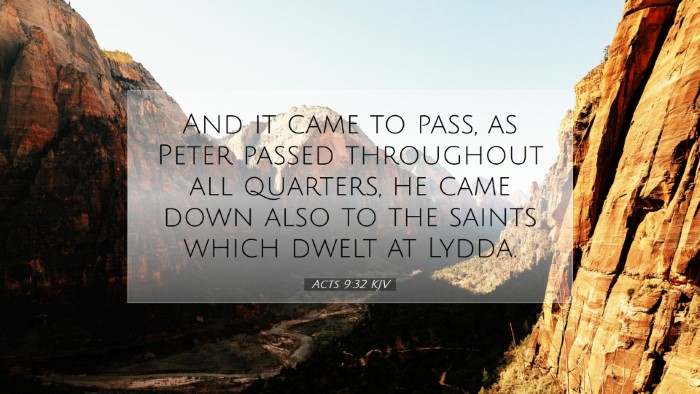Commentary on Acts 9:32
Acts 9:32 states: “Now as Peter went here and there among them all, he came down also to the saints who lived at Lydda.” This verse marks a significant moment in the early church, exemplifying the ministry of the Apostle Peter as he continues to spread the Gospel and encourage believers.
Introduction
This commentary consolidates insights from renowned public domain commentaries, including those by Matthew Henry, Albert Barnes, and Adam Clarke. The focus will be on Peter's actions, the geographical context, and the theological implications of this passage.
Peters's Travels and Ministry
Matthew Henry remarks on Peter's extensive travels throughout Judea, which demonstrate the active role of the apostles in caring for the fledgling church. Peter, as a leader, had the responsibility of visiting various congregations to strengthen their faith and ensure the continuity of their worship practices.
Albert Barnes emphasizes that Peter's visit to Lydda was not just a geographical traveling but also a spiritual mission. It serves as a reminder that the early church was not confined to Jerusalem alone but rather was reaching out to broader areas in Judea. This expansion highlights the fulfillment of Christ’s command in Acts 1:8 — to witness in Jerusalem, Judea, Samaria, and to the ends of the earth.
The Saints at Lydda
According to Adam Clarke, the reference to “the saints” in Lydda indicates that there was a community of believers that had formed there. This suggests that the Gospel had effectively reached various towns and regions, leading to the establishment of Christian collectives outside Jerusalem.
Matthew Henry further notes that these “saints” were a distinct group, signifying their separation from the world around them due to their faith in Christ. This separation implies a deeper spiritual commitment and the importance of community in the Christian faith.
The Significance of Location
Understanding the geographical significance of Lydda is critical. Lydda, located near the ancient city of Joppa, was a vital trade route that connected various regions. Albert Barnes highlights that this location was strategic for the apostles as it would allow them to reach a diverse audience with the Gospel message. The mention of “here and there among them all” indicates Peter's pastoral care and his role as a shepherd to the flock.
- Implication of Peter's Movement: Peter’s movement signifies the dynamic nature of the early church. It shows that apostles were not static figures; they actively engaged with different communities.
- Caring for the Believers: This visit to the saints reveals the pastoral heart of Peter, emphasizing the importance of spiritual care and encouragement among believers.
Spiritual Themes and Lessons
This verse encapsulates several spiritual themes that hold deep meaning for today’s church:
- Leadership and Community: Peter’s role illustrates the importance of church leadership that goes beyond administrative duties, focusing instead on fostering community and spiritual growth.
- Movement and Mission: The ongoing travels of Peter emphasize a mission-driven approach, showing that the church ought to be active and outward-looking in its attempts to witness to the Gospel.
The Broader Context of Acts 9
Placed within the larger narrative of Acts, this passage reflects the ongoing development of the early church post-Pentecost. Adam Clarke comments that the progress of the church during this time is marked by signs and wonders, a theme that is further explored in subsequent verses where miracles occur through Peter’s ministry.
Matthew Henry concludes that the work of the apostles, including Peter’s visit to Lydda, serves as an essential reminder of the transformative power of Christ and the role of the Holy Spirit in guiding believers. This transition from a localized faith to a broader outreach sets the stage for the missionary activities of the church.
Conclusion
Acts 9:32 illustrates not only Peter’s ministry but also reflects the early church's commitment to support one another through visits, prayers, and encouragement. This verse serves as a timely reminder for modern-day believers and church leaders of the importance of pastoral care, the need to nurture spiritual communities, and the ongoing mission of spreading the Gospel.
The insights drawn from Matthew Henry, Albert Barnes, and Adam Clarke collectively underscore the proactive nature of the church in its formative years, encouraging pastors, students, theologians, and Bible scholars to reflect on their involvement in the life of the church today.


